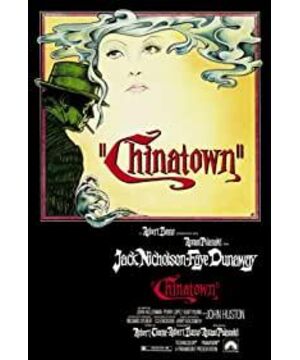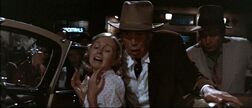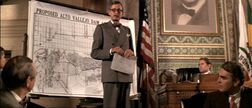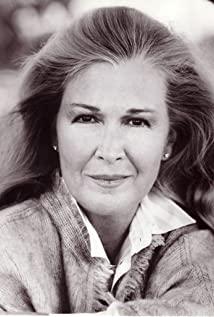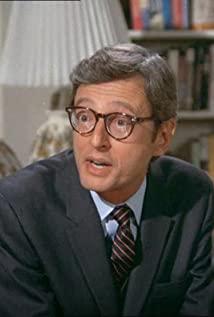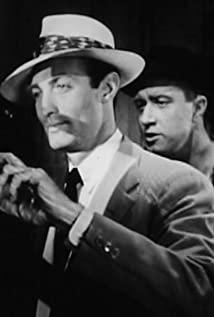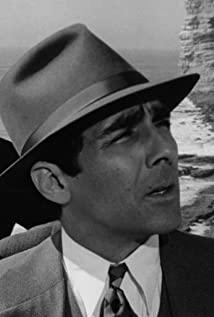-At the end of "Chinatown", the private detective played by Nicholson, Gitis, witnessed her beloved woman being shot through by a bullet after being chased by the beast father and the bastard police. In the back of the head, one of her eyes disappeared, replaced by a blooming hollow wound. A former colleague stepped forward, patted him on the shoulder, half falsely and half pitifully, and said the above sentence. So he followed them stupidly. Surrounded by a group of policemen who had refused to "communicate with them", he left the flustered and messy Chinatown feebly, and the camera rose from this point of view from a cold and compassionate perspective of God. All beings.
It is said that there was almost a bright ending. Kittis finally escaped with Evelyn and flew in two nights. If that happens, "Chinatown" is at best a qualified noir film, at best it is only a long time in Polanski. The list of shining stars is nothing more than a calming one, but it is far from great. Not only did it respond to the universal truth of "Only death is eternal", the more important reason is that the destruction of Evelyn's body is consistent with the spiritual destruction of Gitis, which is death. In the shadow of the huge and dark society, the smallness of the individual, the fragility of justice and morality all coincide with the final outcome of the protagonist, and they are the same by different routes.
The sense of powerlessness that cannot be eliminated, the anger that cannot be dismissed, the fear that cannot be said, these are not the truths that we often experience?
Perhaps it can explain why I have such a paranoid and hard-core fascination with film noir. From the perspective of the story, the classic plot setting of the film noir has a moving charm. It tells the isolated individuals who fight against the irresistible reality in vain. It directly faces the gloom of the society and the loss of the heart, calm, profound, and hard. Straightforward, like a sharp blade that pierces people's hearts; the golden triangle figures of decadent police officers, femme fatales, and perverted killers have been staged in various ways for thousands of years, and countless wonderful stories can be derived; from an aesthetic point of view, film noir has its advantages Unique texture, rough and dark images, lonely lights in empty streets, even cigarettes with slender fingertips, blinds sliding through shadows... In my opinion, these symbolic signs are as beautiful as flowers, moons, and stars. .
"Chinatown" deserves to be ranked first. Although strictly speaking, it belongs to the category of "new film noir" and has nothing to do with the true golden age of so-called film noir. Film noir was born in the United States in the 1940s. It was a rather chaotic period. It was a confluence of post-war anxiety, social unrest, and the upsurge of various thoughts. Film noir quietly appeared, like a pagan, a special The illegitimate illegitimate child is incompatible with Hollywood movies that sing heroism and eulogize the great era.
Existence is reasonable, and film noir reflects the shadow behind the sun. After entering the color film era, film noir has been in decline for a while, but the rise of "new film noir" after the 1960s has once again declared the charm of black, and countless good deeds, experts and scholars label it, deconstruct it, and standardize it. The definition is becoming more and more intense today.
In my mind, "film noir" is immortal, no matter whether it is "new" or "old". Just six or seven years ago, it was an era when the Internet was not arrogantly developed, and if you wanted to watch a remote master's work or a literary film, you still needed to find pirated discs. I got a collection of Roman Polanski's works, "The Pianist". , "The Ninth Gate", "Orphan in the Fog" and so on made me amazed at the craftsmanship of this movie giant's dream, but I was discouraged by "Chinatown", and I still couldn't bring up the interest in watching movies. Now that I think about it, that fashionable and naive, a rush of upward struggle, what I long for is the positive energy like chicken soup, but I have an instinctive rejection of the desperate atmosphere. Now that I have experienced some personnel affairs, I often feel that it is difficult to express my conceit, but I am not too disappointed to see through the world. The film noir appeared just right, not too soon or too late.
If you are young and optimistic, you will not like film noir. If you are worldly numb, you will not like film noir.
Speaking of "Chinatown", the story is very simple. A policeman who once worked in Chinatown and suffered a severe fate, chose to hide in the city in frustration and become a private detective who specializes in prying into the privacy of others. He is cynical and cynical. Until she encountered Evelyn, the daughter of a water tycoon, she was involved in a vortex of crime hidden under the truth. He thought he would be able to stand up again and help justice, but in the end he couldn't compete with the powerful money authority, fell to the bottom, and completed another futile struggle.
However, this simple story is supported by complex social realities. It is based on the water scramble scandal in Los Angeles in the 1930s. The title "Chinatown" comes from a man who used to work as a police officer in Chinatown. He said that in Chinatown, he should "do as little as possible" because there are a series of complicated dialects and gangs, so that a policeman may not know whether they are helping the victim or helping. criminal.
In the movie, "Chinatown" has become a metaphor for the whole film because of its origin. There are inactive policemen and criminals who knowingly commit crimes. With one eye closed, they become a well-known unspoken rule. Whoever breaks the rule is the next victim. . Polanski's feat is to reject all opinions and maintain a tragic ending, allowing evil to triumph and justice to perish.
I like Nicholson's cynical face like facial paralysis, and I try to hide the hotness in my heart with cold eyes; I like Donna Wei's gorgeous and trembling red lips, slightly neurotic beauty, strong tears and desperate sadness. They are not the tragic tough guys and femme fatales in the traditional film noir, but wandering between black and white, with a torn heart and calm appearance. On a certain level, this is a more realistic life. Everyone has a "Chinatown" in his heart. In other words, everyone actually lives in the "Chinatown", experiencing the surging and absurd reality of life.
The movie is something like this-technology can continue to improve, but the narrative skills have basically been developed by the predecessors. To this day, "Chinatown" is still a god-like teaching model, and Robert McGee even uses a lot of script space for teaching in "Story". Many people sneer at the theory of normative dogma, and think privately that before proving your ideas, it is better to honestly pull the film of "Chinatown" first. Not the original script, but the final script made into a movie. Then it can be found that the script of the film has achieved the greatest accuracy and neatness, and every scene conforms to Max’s teaching principles—a complete value conversion. As for the foreshadowing, lines, and transitions, it goes without saying. There has never been a beauty that is completely natural, one point is long, and one point is short. They are all carefully calculated and sculpted. "Chinatown" is such a beauty, she is the perfect combination of the craftsman Polanski and the artist Polanski.
View more about Chinatown reviews


